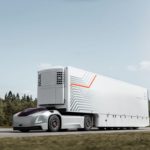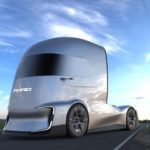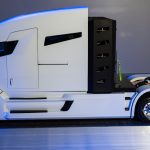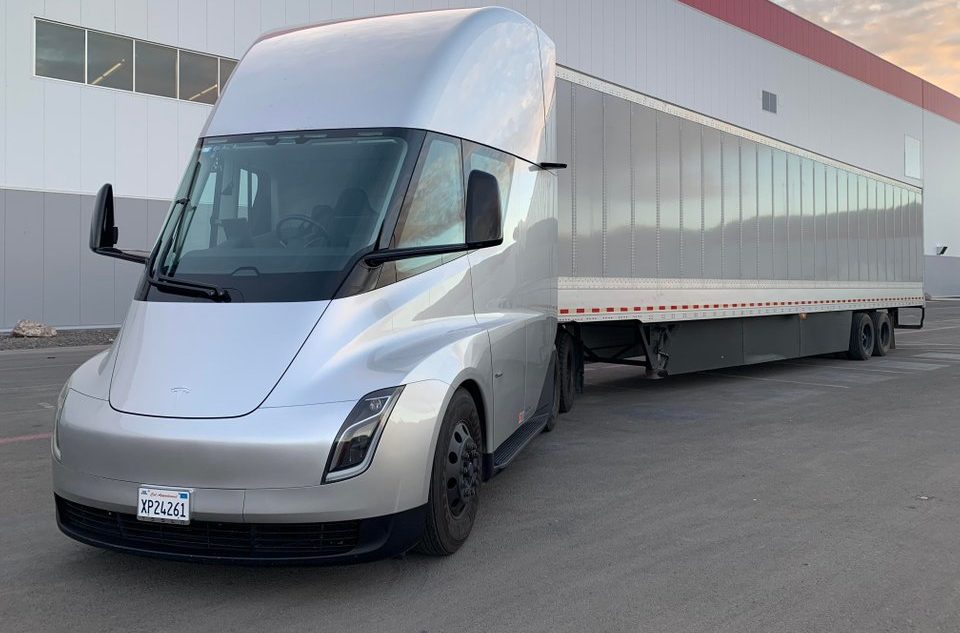
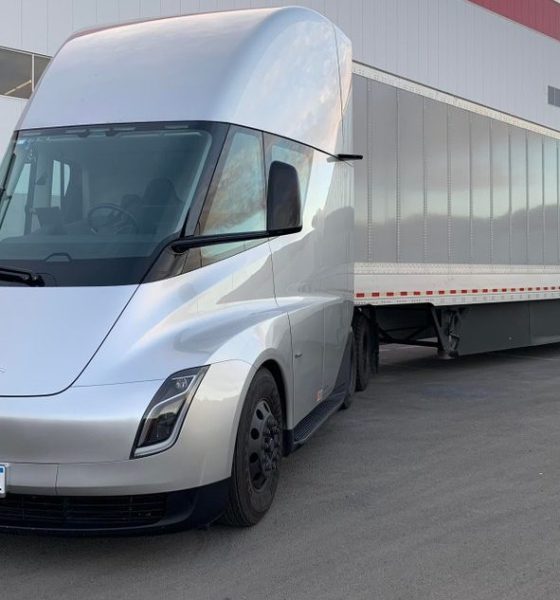
News
The Tesla Semi’s recent Giga 1 sighting highlights its difference from other concept trucks
To say that the Tesla Semi ruffled some feathers when it was unveiled last year is an understatement. Prior to the reveal of all-electric truck, questions were abounding about its viability as an alternative to conventional diesel-powered long-haulers. Even after the Semi’s specs and performance were announced, the vehicle still attracted a lot of skepticism.
During an event for Daimler’s e-Actos electric truck, for example, the company’s Head of Trucks, Martin Daum, noted that Elon Musk’s claims about the Semi’s 300 and 500-mile range are farfetched. Citing limitations in battery tech, Daum stated that “If Tesla really delivers on this promise, we’ll obviously buy two trucks — one to take apart and one to test because if that happens, something has passed us by. But for now, the same laws of physics apply in Germany and in California.” Jon Mills, a spokesman for engine maker Cummins Inc. noted back in August that while electrification is in the future of the trucking industry, the vehicles are not viable in their current state.
Since it was unveiled, the Tesla Semi has been spotted traveling across the United States. Tesla unveiled two working prototypes of the Semi – one painted silver and the other matte black – when it unveiled the vehicle, and so far, both have been spotted testing on US roads. Both trucks were also sighted delivering cargo from Gigafactory 1 in NV to the Fremont factory in CA. Most recently, the silver Tesla Semi was sighted in Gigafactory 1, hauling a trailer and seemingly ready to transport cargo.

Tesla is not the only manufacturer coming up with a zero-emissions truck. As the transport industry starts accelerating its shift towards electrification, even prominent truck companies are coming up with their own green vehicles. Most of these vehicles exist as concepts for now, but they do give an idea of how veteran truckmakers are approaching the industry’s transition to the electric age.
Ford, for one, recently revealed the F-Vision concept, which is loaded to the teeth with cutting-edge tech, including an adaptable windshield that can lower and rise depending on the driver’s preference, as well as front lights that can be fully customized. Last month, Volvo introduced the Vera, its next-generation semi-trailer concept. Unlike Tesla and Ford’s truck, Volvo’s vehicle does not even have a driver’s cabin, as it is designed fully for autonomy. Startup trucking companies are also showcasing their offerings. Nikola Motors, for one, made headlines when it unveiled its long-range sleeper hydrogen-electric truck – the Nikola One – back in December 2016, and the company has since teased its next offering, a day cab called the Nikola Two.
There is little doubt that the upcoming electric truck concepts that have been unveiled so far are exciting vehicles in their own right. Inasmuch as this is the case, though, many of these impressive concepts feature technology that is still yet to be developed or refined. During the F-Vision’s unveiling, for one, Ford clarified that the truck is strictly a concept for now. Volvo’s Vera is a perfect fit for short-haul trips thanks to its 300 kWh battery that gives it a 187-mile range, but the vehicle can’t be deployed anytime soon since self-driving tech is still under development (even autonomous tech leader Waymo is reportedly struggling with its fleet’s real-world testing). Nikola’s hydrogen-electric trucks are powerful and boast long-range, but they would need a network of H2 refilling stations before they can be a viable alternative to diesel trucks. As a result, most zero-emissions truck concepts, including the Nikola One prototype, are yet to be sighted doing real-world tests on public roads.
- The Volvo Vera. [Credit: Volvo]
- The Ford F-Vision concept. [Credit: Ford]
- The Nikola One
This is where the Tesla Semi is different. Among the upcoming electric trucks in the market, the Semi is the one undergoing consistent, intensive real-world testing. The vehicle has been spotted in multiple states since its unveiling, at times even visiting the sites of reservation holders like UPS, J.B. Hunt and PepsiCo. As it conducts its extensive real-world tests, the vehicle undergoes a consistent process of improvement. This was highlighted by Tesla’s Head of Automotive Jerome Guillen during the Q2 2018 earnings call, when he stated that several improvements have already been introduced to the electric truck since it was unveiled last year. Elon Musk even teased on Twitter that the Semi would likely have closer to 600 miles of range per charge. With this, it seems safe to infer that the production version of the Tesla Semi would be better than the prototype that is currently traveling across the country today.
The Tesla Semi balances its features without overdoing it as well. It does not have the cloud-based autonomy of concepts like the Vera or the flashy variable front design of the Ford F-Vision, but ultimately, it does not need to have all these extra bells and whistles to become effective at what it’s designed to do. Tesla created the Semi to be a viable alternative to diesel-powered long-haulers, and if recent sightings and its consistent road tests is any indication, it appears that the vehicle is poised to be exactly that.
The Tesla Semi is expected to start production sometime in 2019. Recent reports have indicated that Tesla is planning on “earnestly” producing the Semi sometime in 2020.

News
Tesla ships out update that brings massive change to two big features
“This change only updates the name of certain features and text in your vehicle,” the company wrote in Release Notes for the update, “and does not change the way your features behave.”

Tesla has shipped out an update for its vehicles that was caused specifically by a California lawsuit that threatened the company’s ability to sell cars because of how it named its driver assistance suite.
Tesla shipped out Software Update 2026.2.9 starting last week; we received it already, and it only brings a few minor changes, mostly related to how things are referenced.
“This change only updates the name of certain features and text in your vehicle,” the company wrote in Release Notes for the update, “and does not change the way your features behave.”
The following changes came to Tesla vehicles in the update:
- Navigate on Autopilot has now been renamed to Navigate on Autosteer
- FSD Computer has been renamed to AI Computer
Tesla faced a 30-day sales suspension in California after the state’s Department of Motor Vehicles stated the company had to come into compliance regarding the marketing of its automated driving features.
The agency confirmed on February 18 that it had taken a “corrective action” to resolve the issue. That corrective action was renaming certain parts of its ADAS.
Tesla discontinued its standalone Autopilot offering in January and ramped up the marketing of Full Self-Driving Supervised. Tesla had said on X that the issue with naming “was a ‘consumer protection’ order about the use of the term ‘Autopilot’ in a case where not one single customer came forward to say there’s a problem.”
This was a “consumer protection” order about the use of the term “Autopilot” in a case where not one single customer came forward to say there’s a problem.
Sales in California will continue uninterrupted.
— Tesla North America (@tesla_na) December 17, 2025
It is now compliant with the wishes of the California DMV, and we’re all dealing with it now.
This was the first primary dispute over the terminology of Full Self-Driving, but it has undergone some scrutiny at the federal level, as some government officials have claimed the suite has “deceptive” names. Previous Transportation Secretary Pete Buttigieg was one of those federal-level employees who had an issue with the names “Autopilot” and “Full Self-Driving.”
Tesla sued the California DMV over the ruling last week.
News
Tesla workers push back against Giga Berlin unionization
“IG Metall did not succeed in Giga Berlin‘s works council election earlier today. The union share was reduced from nearly 40% in 2024 to 31% in 2026! This is a clear message by the Giga Berlin team towards an independent co-determination! The list called Giga United, led by the current chairwoman, Michaela Schmitz, received the most votes with more than 40%! Good news for Giga Berlin!”

Tesla workers pushed back against unionization efforts at Gigafactory Berlin, and over the past few years, there has been a dramatic decrease in interest to unionize at the German plant.
Gigafactory Berlin Plant Manager André Thierig announced on Wednesday that IG Metall, the European union group, saw its share reduce from 40 to 31 percent in 2026 as employees eligible to vote on the issue. Instead, the Giga Berlin team, known as Giga United, received the most votes with more than 40 percent.
BREAKING! 🚨
IG Metall did not succeed in Giga Berlin‘s works council election earlier today. The union share was reduced from nearly 40% in 2024 to 31% in 2026!
This is a clear message by theGiga Berlin team towards an independent co-determination!
The list called Giga…
— André Thierig (@AndrThie) March 4, 2026
Thierig gave specific details in a post on X:
“IG Metall did not succeed in Giga Berlin‘s works council election earlier today. The union share was reduced from nearly 40% in 2024 to 31% in 2026! This is a clear message by the Giga Berlin team towards an independent co-determination! The list called Giga United, led by the current chairwoman, Michaela Schmitz, received the most votes with more than 40%! Good news for Giga Berlin!”
There were over 10,700 total employees who were eligible to vote, with 87 percent of them turning out to cast what they wanted. There were three key outcomes: Giga United, IG Metall, and other notable groups, with the most popular being the Polish Initiative.
The 37-seat council remains dominated by non-unionized representatives, preserving Giga Berlin as Germany’s only major auto plant without a collective bargaining agreement.
Thierig and Tesla framed the outcome as employee support for an “independent, flexible, and unbureaucratic” future, enabling acceleration on projects like potential expansions or new models. IG Metall expressed disappointment, accusing management of intimidation tactics and an “unfair” campaign.
The first election of this nature happened back in 2022. In 2024, IG Metall emerged as the largest single faction with 39.4 percent, but non-union lists coalesced for a majority.
But this year was different. There was some extra tension at Giga Berlin this year, as just two weeks ago, an IG Metall rep was accused by Tesla of secretly recording a council meeting. The group countersued for defamation.
Tesla Giga Berlin plant manager faces defamation probe after IG Metall union complaint
This result from the 2026 vote reinforced Tesla’s model of direct employee-management alignment over traditional German union structures, amid ongoing debates about working conditions. IG Metall views it as a setback but continues advocacy. Tesla sees it as validation of its approach in a competitive EV market.
This outcome may influence future labor dynamics at Giga Berlin, including any revival of expansion plans or product lines, which Musk has talked about recently.
News
SpaceX President Gwynne Shotwell details xAI power pledge at White House event
The commitment was announced during an event with United States President Donald Trump.

SpaceX President Gwynne Shotwell stated that xAI will develop 1.2 gigawatts of power at its Memphis-area AI supercomputer site as part of the White House’s new “Ratepayer Protection Pledge.”
The commitment was announced during an event with United States President Donald Trump.
During the White House event, Shotwell stated that xAI’s AI data center near Memphis would include a major energy installation designed to support the facility’s power needs.
“As you know, xAI builds huge supercomputers and data centers and we build them fast. Currently, we’re building one on the Tennessee-Mississippi state line. As part of today’s commitment, we will take extensive additional steps to continue to reduce the costs of electricity for our neighbors…
“xAI will therefore commit to develop 1.2 GW of power as our supercomputer’s primary power source. That will be for every additional data center as well. We will expand what is already the largest global Megapack power installation in the world,” Shotwell said.
She added that the system would provide significant backup power capacity.
“The installation will provide enough backup power to power the city of Memphis, and more than sufficient energy to power the town of Southaven, Mississippi where the data center resides. We will build new substations and invest in electrical infrastructure to provide stability to the area’s grid.”
Shotwell also noted that xAI will be supporting the area’s water supply as well.
“We haven’t talked about it yet, but this is actually quite important. We will build state-of-the-art water recycling plants that will protect approximately 4.7 billion gallons of water from the Memphis aquifer each year. And we will employ thousands of American workers from around the city of Memphis on both sides of the TN-MS border,” she noted.
The Ratepayer Protection Pledge was introduced as part of the federal government’s effort to address concerns about rising electricity costs tied to large AI data centers, as noted in an Insider report. Under the agreement, companies developing major AI infrastructure projects committed to covering their own power generation needs and avoiding additional costs for local ratepayers.
